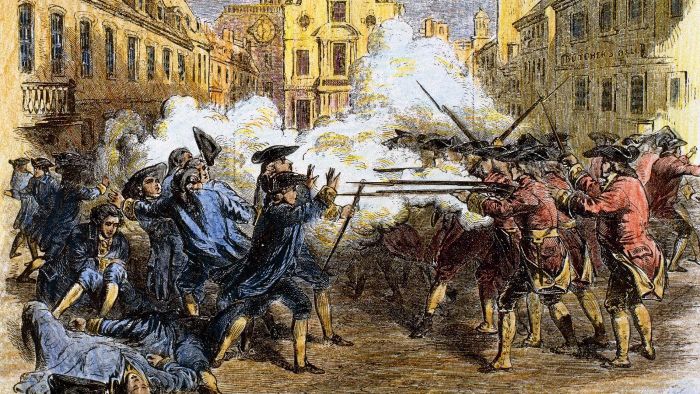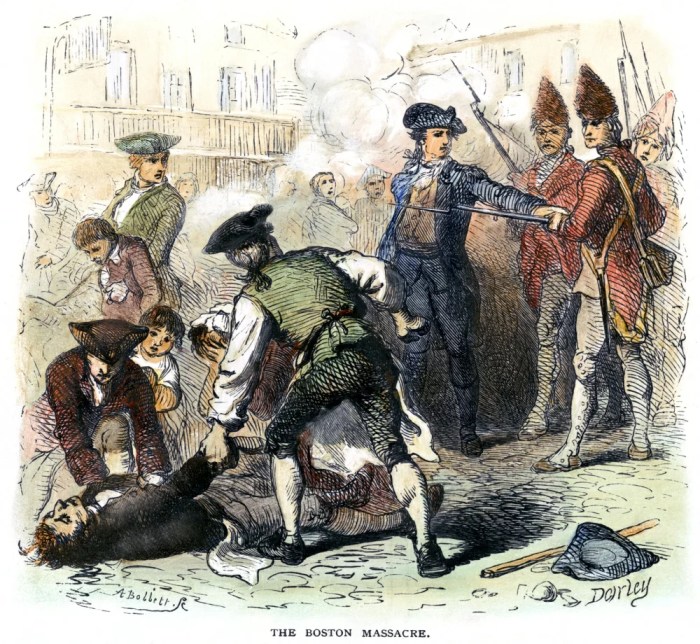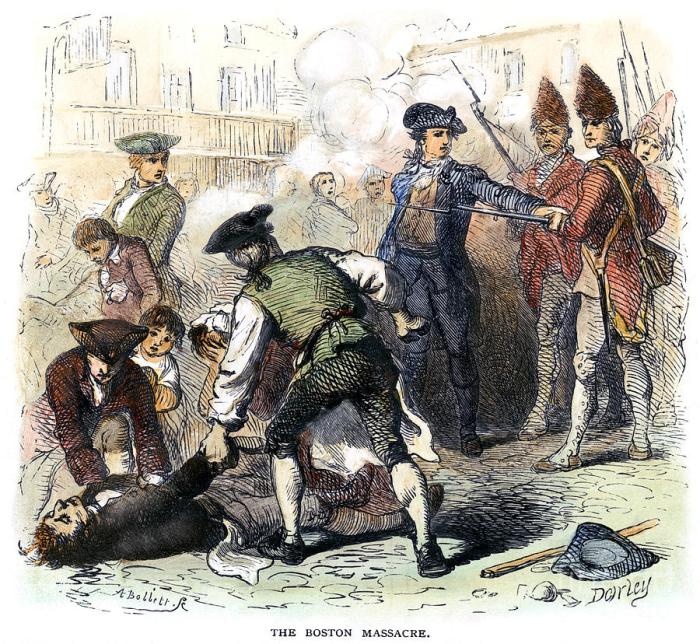Boston Massacre Date, March 5, 1770, marks a pivotal moment in the burgeoning conflict between Great Britain and its American colonies. This tragic incident, where British soldiers fired on a crowd of unarmed colonists, sparked outrage and fueled the flames of rebellion that would eventually lead to the American Revolution.
The event, often depicted in iconic historical paintings, serves as a powerful reminder of the escalating tensions and the volatile political climate that gripped the colonies in the late 18th century.
The Boston Massacre wasn’t just a random act of violence. It was a culmination of simmering resentment over British policies and the growing sense of colonial identity. The presence of British troops in Boston, intended to enforce British authority, had created friction and animosity.
Colonists felt increasingly alienated by British economic policies and perceived attempts to undermine their autonomy. The incident on that fateful March day became a rallying cry for the colonists, solidifying their resolve to fight for their rights and independence.
Historical Context of the Boston Massacre
The Boston Massacre, a pivotal event in the lead-up to the American Revolution, was not an isolated incident but rather a culmination of simmering tensions between the British government and the American colonists. To understand the tragedy, it is crucial to delve into the political and social climate of Boston in the years preceding the event.
British Troops in Boston
The presence of British troops in Boston was a significant source of friction. Following the French and Indian War, the British government stationed a sizable military force in the city to maintain order and enforce its policies. However, the colonists viewed the troops as an occupying force, a symbol of British authority and control.
The presence of soldiers, many of whom were unfamiliar with colonial customs and often clashed with local residents, fueled resentment and animosity.
Tensions between Colonists and Soldiers
Tensions between colonists and soldiers escalated rapidly in the years leading up to the massacre. Economic hardship, fueled by British policies such as the Stamp Act and the Townshend Acts, created a climate of discontent. The colonists protested against these measures, viewing them as unjust and oppressive.
The British government responded with a crackdown, further intensifying the conflict.
- Economic hardship: The British government’s policies, such as the Stamp Act and the Townshend Acts, placed significant economic burdens on the colonists. These policies were seen as attempts to raise revenue from the colonies without their consent, leading to widespread resentment and protests.
The colonists saw these measures as a violation of their rights and a blatant attempt to control their economic affairs.
- Ideological conflicts: The colonists held strong beliefs in liberty and self-government. They viewed the British government’s attempts to impose its will on them as a threat to their fundamental freedoms. The growing tensions were rooted in a clash of ideologies, with the colonists advocating for self-determination and the British government seeking to maintain control over its colonies.
- Political tensions: The colonists were increasingly dissatisfied with British rule and its policies. They saw the British government as unresponsive to their concerns and unwilling to address their grievances. The growing political tensions, fueled by the economic and ideological conflicts, created a volatile atmosphere in Boston and other colonial cities.
Economic and Ideological Conflicts
The Boston Massacre was a manifestation of deeper economic and ideological conflicts between Britain and the American colonies. The British government’s policies aimed to control colonial trade and extract revenue from the colonies, often at the expense of colonial interests.
The colonists, in turn, sought to maintain their economic autonomy and resist British control.
- Economic control: The British government sought to control colonial trade through a series of acts, such as the Navigation Acts and the Stamp Act. These acts aimed to restrict colonial trade with other nations and ensure that British goods were favored.
The colonists viewed these measures as an attempt to exploit their economy and stifle their growth. They argued that they had the right to trade freely with other nations and that the British government was interfering with their economic interests.
- Taxation without representation: The colonists were outraged by the British government’s imposition of taxes without their consent. They argued that they should not be taxed without having representation in the British Parliament. The colonists viewed this as a violation of their fundamental rights and a form of tyranny.
The cry of “No taxation without representation” became a rallying cry for the colonists, encapsulating their opposition to British rule.
- Ideological differences: The Boston Massacre also highlighted the growing ideological differences between Britain and the colonies. The colonists were increasingly embracing Enlightenment ideals of liberty and self-government. They saw the British government’s policies as a threat to their freedoms and a denial of their right to self-determination.
The colonists believed that they had the right to govern themselves and that they should not be subject to the dictates of a distant government.
Aftermath and Impact of the Boston Massacre

The Boston Massacre, a tragic event where British soldiers fired on unarmed colonists, sent shockwaves through the colonies and irrevocably altered the course of Anglo-American relations. The immediate aftermath was marked by widespread outrage, while the long-term impact fueled the flames of revolution and ultimately led to the birth of a new nation.
Immediate Reactions and Propaganda
The massacre sparked immediate and widespread outrage in Boston and throughout the colonies. News of the event spread rapidly, fueled by inflammatory accounts and graphic illustrations that depicted the British soldiers as brutal and merciless. These accounts, often exaggerated or fabricated, played a crucial role in shaping public opinion and turning the massacre into a rallying cry for colonial resistance.
The Boston Massacre, a pivotal event in the lead-up to the American Revolution, took place on March 5, 1770. While this historical event unfolded in Boston, those seeking dermatological care in Concord can find expert treatment at dermatology associates of concord.
Just as the Boston Massacre sparked a fight for liberty, the fight for healthy skin can be found in the dedicated care provided by these dermatologists.
- Public Outrage and Protests:The news of the massacre ignited public outrage in Boston, with citizens demanding justice for the victims. Protests and demonstrations erupted, fueled by the inflammatory accounts and images circulating throughout the colonies.
- Role of Propaganda:The massacre was quickly exploited by colonial leaders and propagandists, who used it to galvanize support for the growing resistance movement against British rule. Engravings like Paul Revere’s famous depiction of the event, which exaggerated the violence and portrayed the British as aggressors, became powerful symbols of colonial oppression.
- The Committees of Correspondence:The massacre further galvanized the Committees of Correspondence, a network of communication established by colonial leaders to coordinate resistance efforts. These committees played a vital role in disseminating information about the massacre and mobilizing colonial support against British policies.
Long-Term Impact and Legacy
The Boston Massacre, while a relatively minor incident in itself, had a profound and lasting impact on the relationship between Britain and the colonies. It served as a potent symbol of British tyranny and fueled the growing sentiment for independence.
- Rise of Revolutionary Sentiment:The massacre fueled the flames of revolutionary sentiment, further alienating colonists from British rule. It solidified the belief that British authority was oppressive and unjust, and that the colonies had the right to defend themselves against tyranny.
- Shifting Public Opinion:The massacre marked a turning point in public opinion, shifting from a desire for reconciliation to a demand for independence. The event galvanized colonial leaders and ignited a widespread desire for self-governance, leading to a more unified and determined resistance movement.
- Legacy and Symbolism:The Boston Massacre remains a powerful symbol of the struggle for liberty and self-determination. It serves as a reminder of the sacrifices made by those who fought for independence and the importance of resisting tyranny.
Concord, Massachusetts, and the American Revolution
Concord, Massachusetts, holds a pivotal place in the narrative of the American Revolution. This small town became the focal point of the first major military engagement between the colonists and British forces, marking a turning point in the struggle for independence.
The Battle of Lexington and Concord
The events of April 19, 1775, known as the Battle of Lexington and Concord, are considered the opening shots of the American Revolution. The British Army, under the command of Lieutenant Colonel Francis Smith, embarked on a mission to seize colonial military supplies stored in Concord.
The British marched towards Concord, aiming to capture the colonial military supplies. The colonists, alerted to the British advance, prepared to defend their town.
- Lexington:The British troops encountered a small contingent of colonial militia at Lexington Green. The exchange of gunfire, often referred to as the “shot heard ’round the world,” marked the start of the battle.
- Concord:The British reached Concord and destroyed some military supplies, but the colonists, having received reinforcements, engaged the British in a fierce battle. The British were forced to retreat, pursued by colonial militia along the road back to Boston.
Concord’s Role in Shaping American Identity
The Battle of Lexington and Concord had a profound impact on the development of American identity and the fight for independence.
- Awakening of Resistance:The events of April 19, 1775, galvanized colonial resistance to British rule. The colonists, initially hesitant to engage in open conflict, were now united in their determination to defend their rights and freedoms.
- Military Success:The colonists’ successful defense of Concord demonstrated their ability to resist the British military, bolstering their confidence and inspiring others to join the cause.
- Symbol of Freedom:Concord became a symbol of American independence and the spirit of resistance against tyranny. The town’s name resonated throughout the colonies, representing the struggle for liberty and self-governance.
Other Places and Events Related to “Concord”

The name “Concord” is not unique to the town in Massachusetts, and its usage in other places across the United States reflects the enduring significance of the concept of harmony and unity that the name represents. Several towns and cities share this name, each with its own distinct history and cultural associations.
Concord, North Carolina
Concord, North Carolina, is a city in Cabarrus County, situated about 20 miles northeast of Charlotte. The city was founded in 1792 and named “Concord” in recognition of the peaceful resolution of a dispute between two neighboring communities. Concord’s history is intertwined with the development of the textile industry in the South.
The city played a crucial role in the Civil War, serving as a strategic location for both Union and Confederate forces. Concord is also known for its rich cultural heritage, with notable landmarks such as the Cabarrus County Historical Museum and the Concord Museum.
Concord, New Hampshire
Concord, New Hampshire, is the state capital and is located on the Merrimack River. It was founded in 1725 and named “Concord” by its first settlers, who were drawn to the region’s natural beauty and the abundance of resources.
Concord played a pivotal role in the American Revolution, hosting the Continental Congress in 1774 and serving as a base for the Continental Army during the war. The city is home to the New Hampshire State House, a grand neoclassical building that stands as a symbol of the state’s history and government.
Concord, California, Boston massacre date
Concord, California, is a city located in the East Bay region of the San Francisco Bay Area. It was founded in 1869 and named “Concord” by its developers, who envisioned a community that would foster harmony and unity among its residents.
Concord’s history is closely tied to the development of the region’s agriculture and the growth of the Bay Area’s economy. The city is home to several notable landmarks, including the Concord Naval Weapons Station, a former military base that now serves as a park and recreation area.
The Meaning of “Concord”
The name “Concord” is derived from the Latin word “concordia,” which means “harmony” or “agreement.” This name was chosen for various settlements across the United States to symbolize the hope for peaceful coexistence and unity among its residents. The name “Concord” has been associated with the concept of harmony and unity for centuries, and its use in different places across the country reflects the enduring significance of this ideal.
Conclusive Thoughts: Boston Massacre Date

The Boston Massacre remains a stark reminder of the fragility of peace and the devastating consequences of unchecked power. The event’s legacy continues to resonate in American history, serving as a cautionary tale about the dangers of political and social unrest.
It also underscores the importance of dialogue, compromise, and peaceful resolution in navigating complex social and political issues. The echoes of the Boston Massacre reverberate through the annals of American history, reminding us of the sacrifices made and the struggles endured in the pursuit of liberty and self-determination.